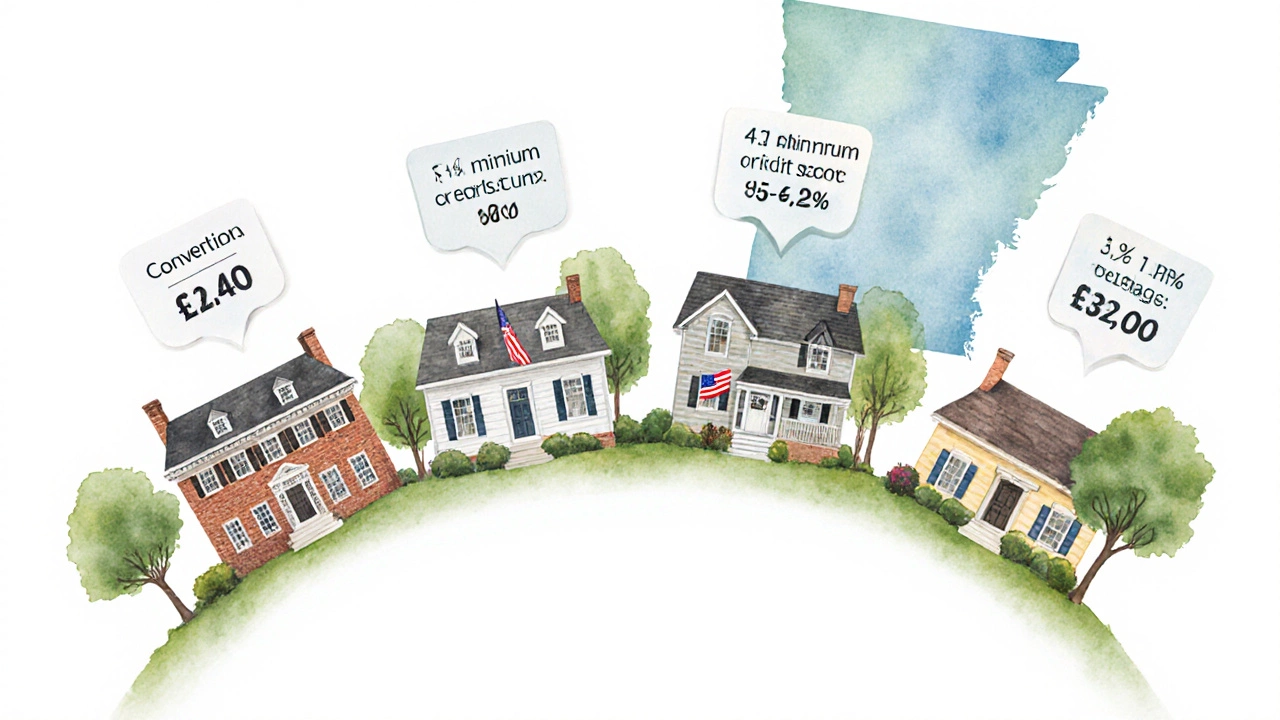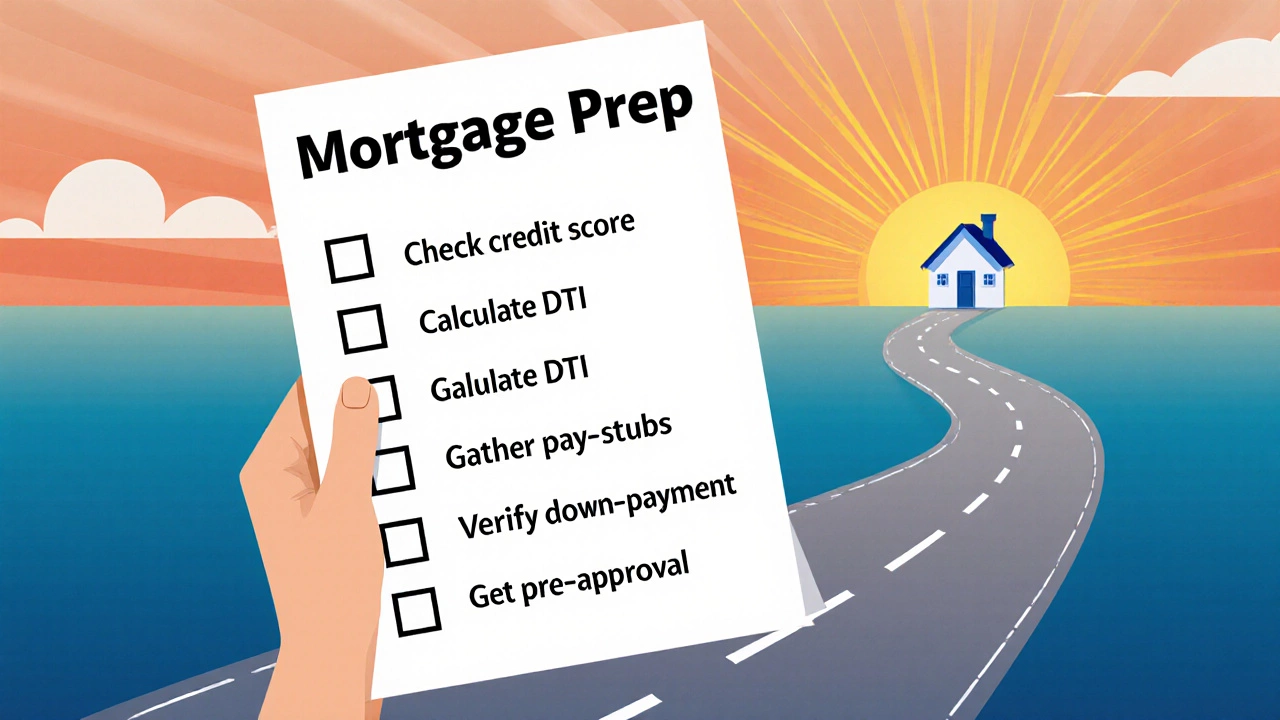Arkansas Homebuyer Credit Score Requirements
 Oct, 19 2025
Oct, 19 2025
Arkansas Credit Score Mortgage Calculator
Calculate Your Mortgage Options
Mortgage Eligibility Results
Your Estimated Interest Rates
Conventional Loan
FHA Loan
VA Loan
USDA Loan
Your Estimated Monthly Payment
Conventional Loan
FHA Loan
Potential Savings
When you start looking for a home in Arkansas, Credit Score is a three‑digit number that reflects how reliably you’ve paid past debts becomes the first gatekeeper. Lenders use it to decide whether to approve you, how much interest you’ll pay, and even which loan programs you qualify for.
Why the Credit Score Matters More Than Anything Else
A good Arkansas credit score can mean the difference between a 3.5% interest rate on an FHA loan and a 5% rate on a conventional loan. The lower your score, the more you’ll pay over a 30‑year mortgage - often tens of thousands of dollars.
Most lenders look at three core things: the credit score itself, the debt‑to‑income (DTI) ratio, and the size of your down payment. If any one of those metrics is out of line, the loan may be denied or priced higher.
Understanding Arkansas‑Specific Credit Score Benchmarks
Arkansas doesn’t have its own unique scoring model; it uses the national FICO and VantageScore systems. However, local lenders often set slightly different cut‑offs based on the state’s housing market and average income levels.
- Excellent (740+): Qualifies for the best rates on conventional, FHA, and VA loans.
- Good (700‑739): Still eligible for most loan programs, but may see a small rate bump.
- Fair (660‑699): FHA loans become the most realistic option; conventional loans start requiring higher down payments.
- Poor (below 660): You’ll need a larger down payment (often 10‑20%) or a co‑signer, and only a few niche lenders will work with you.
These ranges align with the guidelines from the Federal Housing Administration (FHA) and the Veterans Administration (VA), both of which are popular in Arkansas because they allow lower down payments.
Loan Types and Their Credit Score Requirements
| Loan Type | Minimum Credit Score | Typical Down Payment | Key Benefits |
|---|---|---|---|
| Conventional Loan | 620 (740 for best rates) | 3‑20% | Flexible terms, no mortgage insurance with >20% equity |
| FHA Loan | 580 (620 for lower‑rate options) | 3.5% | Lenient credit, low down payment, popular in rural Arkansas |
| VA Loan | 620 (no minimum for some veterans) | 0% | No down payment, no private mortgage insurance (PMI) |
| USDA Rural Development Loan | 640 | 0% | Designed for rural Arkansas, low interest rates |
Each loan type has its own set of underwriting rules, but credit score is the constant. If you’re sitting at a 680, an FHA loan will likely give you the most affordable path to ownership in Little Rock or Fayetteville.

How Lenders Calculate Your Mortgage Eligibility
Beyond the raw score, lenders run a Credit Report pull from the three major Credit Bureaus - Experian, TransUnion, and Equifax. They look for:
- Payment history - the single biggest factor (35% of the FICO score).
- Amounts owed - how much of your available credit you’re using.
- Length of credit history - older accounts boost your score.
- New credit - recent hard inquiries can dip the score.
- Mix of credit types - installment loans vs. revolving credit.
After the score, the lender checks your Debt‑to‑Income Ratio. Most Arkansas lenders want a DTI under 45%, though FHA allows up to 50% in certain cases.
Practical Steps to Boost Your Score Before Applying
If your score falls short of the needed threshold, you have a few proven moves:
- Pay down revolving balances. Aim for under 30% utilization on each card.
- Correct errors. Dispute inaccurate late payments on your credit report.
- Become an authorized user. Adding a family member with a strong credit history can lift yours.
- Keep old accounts open. Length of history helps, even if you don’t use the card.
- Limit new inquiries. Each hard pull can shave 5‑10 points.
Give yourself at least 30‑60 days after making these changes before you ask a lender for a pre‑approval. That window lets the credit bureaus update the score.

Choosing the Right Lender in Arkansas
Not all Arkansas lenders treat credit scores the same way. Community banks in Little Rock often have more flexibility for local borrowers, while national banks may stick rigidly to the 620 baseline for conventional loans. Credit unions usually offer lower fees and may be willing to work with a 600‑plus score if you have a solid employment history.
When you interview a lender, ask these specific questions:
- What is the minimum credit score for each loan program?
- Do you consider alternative data (rent payments, utilities) for low‑score applicants?
- What is the typical rate spread between a 680 and a 740 score?
- Are there any first‑time‑homebuyer incentives specific to Arkansas?
Getting clear answers will help you avoid surprise rate hikes during closing.
Quick Checklist Before Submitting a Mortgage Application
- Know your current credit score - check all three bureaus.
- Identify the loan program that fits your score and down‑payment ability.
- Gather recent pay stubs, tax returns, and bank statements.
- Calculate your DTI - stay under 45% if possible.
- Secure a pre‑approval letter to strengthen your offer on a house.
Follow this list and you’ll walk into the Arkansas real‑estate market with confidence.
What is the minimum credit score to qualify for an FHA loan in Arkansas?
FHA loans accept scores as low as 580 for a 3.5% down payment. If your score falls between 500 and 579, you’ll need at least a 10% down payment and may face higher rates.
Can I buy a house in Arkansas with a 620 credit score?
Yes, a 620 score meets the baseline for most conventional loans, but you’ll likely need a larger down payment (10‑20%) and may pay a higher interest rate. An FHA loan could give you a lower down payment at the same score.
Do Arkansas lenders consider alternative credit data?
Many local lenders, especially credit unions, will look at rent, utility, and cell‑phone payment histories if your traditional credit file is thin. This can help applicants with scores below 620.
How much does a higher credit score save me over a 30‑year mortgage?
A difference of 40 points (e.g., 700 vs. 660) can shave 0.25‑0.5% off the interest rate. On a $250,000 loan, that translates to roughly $15,000‑$30,000 less paid over 30 years.
What first‑time‑homebuyer programs exist in Arkansas?
The Arkansas Development Finance Authority (ADFA) offers down‑payment assistance and low‑interest loans for qualifying buyers. USDA Rural Development and VA benefits also apply to eligible borrowers.
